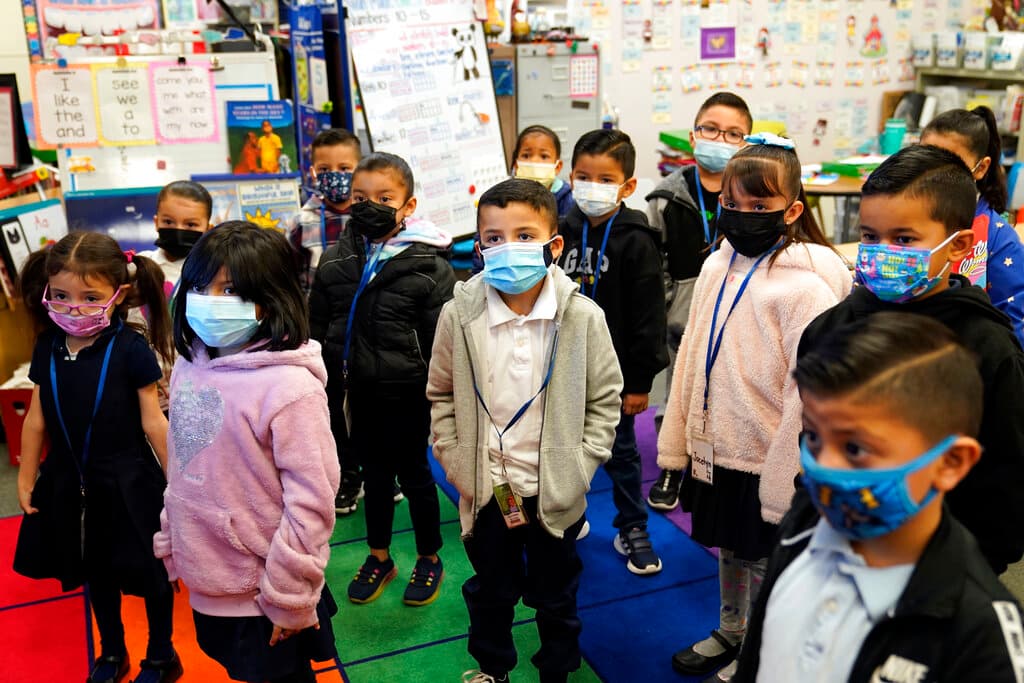After Decades of Dominating the Issue, Democrats Losing Voters’ Trust on Education Policy
A handful of new polls suggest that voters, after more than two years of pandemic-related policies and debate over school curricula, trust Republicans more than they do Democrats when it comes to educating their children.

New polling on the American electorate’s political preferences when it comes to education policy suggests that, after decades of dominating the issue in the eyes of many voters, Democrats are losing trust when it comes to schooling issues.
A handful of new polls show that voters trust Republicans more than they do Democrats when it comes to educating their children. The latest, by Impact Research, surveyed likely voters in contested congressional districts and found that 46 percent of voters trusted Republicans more on education, to 43 percent trusting Democrats.
“This poll shows that Democrats’ historic advantage on education has been erased,” a partner at Impact Research, Matthew Hogan, said. “Democrats typically enjoyed a double-digit advantage on which party was more trusted on education before the pandemic.”
The poll was commissioned by a Democratic pro-school-choice group, Education Reform Now.
The poll follows two earlier surveys with similar findings. A March Rasmussen poll found that 43 percent of voters trusted Republicans more with education, to 36 percent who had more trust in Democrats.
A second survey, commissioned by the second-largest teachers union, the American Federation of Teachers, in May came to a similar conclusion — that 39 percent of respondents favored the GOP compared to 38 percent who favored Democrats.
A former Republican National Committee spokesman, Robert Lockwood, said the shifting voter preferences are the result of a refocusing of the education debate.
“For a long time, discussions about education have been about funding,” Mr. Lockwood, now a media strategist, said. Previously, Democrats won over public opinion because of the perception that they were willing to spend more money than Republicans.
Now, however, he said, Republicans “have been able to flip the framework” to issues not easily resolved by funding increases. The education debate, he said, is now more focused more on content — school curricula, for example — than funding.
Mr. Lockwood pointed to the Virginia gubernatorial election last fall. Conservative activists and Governor Youngkin’s campaign zeroed in on American history curricula and the growing dominance of racial and identity politics influenced by critical race theory in public schools.
Mr. Youngkin campaigned on promises to re-involve parents in their children’s curricula and to “ban critical race theory on day one.”
His opponent, Governor McAuliffe, steered a different course to placate the powerful teachers’ unions and was roundly criticized for it. “I don’t think parents should be telling schools what they should teach,” he said during one debate.
Virginia voters “started to look at the left and say they only want to teach the bad,” Mr. Lockwood said. “They want to rewrite history. They want to undermine faith in the Founding Fathers, in the Constitution.”
Mr. Youngkin’s campaign stuck to his messaging about empowering parents, and his victory was touted as a success for the culture warriors of the right and the Republican Party more broadly.
“Republicans are seeing an uptick because they’ve done a very good job of messaging on that front and getting people to care about what’s being taught, as opposed to how much you’re paying teachers,” Mr. Lockwood said.
Besides school curricula, Mr. Youngkin’s campaign and the GOP more broadly fought forced masking, school closures, and other Covid-related protocols that, while accepted initially, proved unpopular as the pandemic dragged out.
“Culture wars have shown that people do care what’s being taught in the classroom, and they want their kids in the classroom,” Mr. Lockwood said, referring to school closures.
Democrats and the teachers’ unions largely favored longer school closures, while Republicans such as Florida’s governor prioritized returning to in-person learning sooner.
“Kids not being in school was detrimental,” Mr. Lockwood said. “You had parents from all political persuasions saying, ‘We just want our kids back in the classroom’ for a multitude of reasons — personal, social development, and also professional. These parents have to go to work.”
While the issue of school closures may be waning, pandemic-related questions about student development and learning persist.
In the Education Reform Now poll, two-thirds of respondents said closing the learning gap that occurred during the pandemic was the most important education priority right now, but few think that either major party shares that goal.
Respondents see the two political parties as more focused on cultural issues than post-pandemic learning plans. Only 27 percent of respondents thought addressing race and gender education should be a priority, while two-thirds said making up pandemic learning-loss should be the priority.
Less than a third of respondents thought either party was prioritizing learning loss, whereas about half saw each party prioritizing race and gender education.
A memo from the firm that conducted the American Federation of Teachers poll, Hart Research, recommended that to regain lost ground Democrats should focus on “reminding voters that the Republican strategy of politicizing schools is undermining our children’s education.”
“Whenever possible focus attention on Democrats’ investment agenda for public education,” the memo states. “While Democrats have effective rebuttals to GOP culture war attacks, we always want to move the debate back to investing in schools, which is our comparative advantage.”

